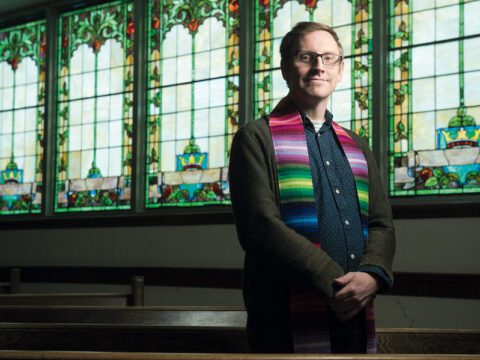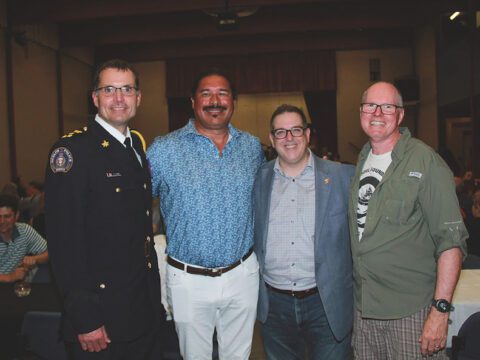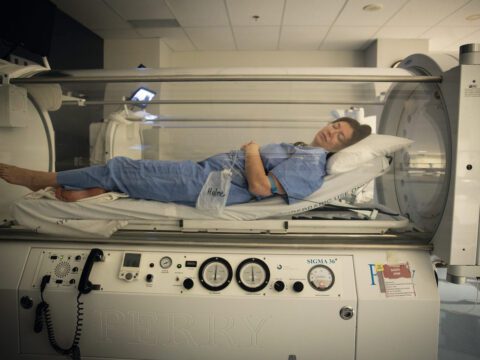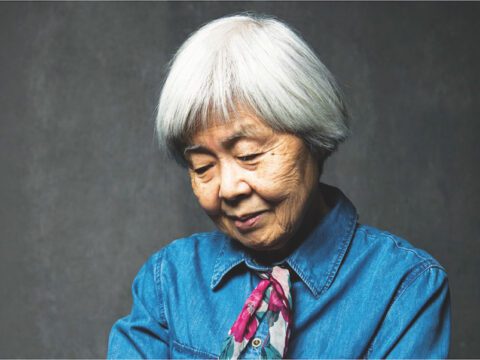In September, thousands of people across Canada rallied at legislatures, city halls and school board offices chanting slogans and carrying signs that read “Hands off our kids.”
The rallies had the appearance of a grassroots movement led by concerned parents, but the “1 Million March 4 Children” was the fruit of months of organizing by far-right groups that include Christian nationalists, conservative Muslim activists, COVID conspiracy theorists and believers in “climate fraud.”
In recent months, they have rallied around the goal of eliminating sex and gender curricula from public schools, along with other vital supports for queer and trans youth. By framing their cause as a campaign for “parental rights,” organizers have managed to attract parents from newcomer communities. Many parents took part in the marches because they’d been told schools were trying to confuse or sexualize their children. In one Winnipeg school division, more than 1,000 children stayed home from school after disinformation in Punjabi, Hindi and Arabic circulated on Facebook saying that children would be exposed to graphic sexual material if they attended classes that day.
The rallies were a wake-up call for anyone who wasn’t already aware that queer and trans youth in this country are under attack. But to the parents and allies of queer and trans youth, the marches were merely the latest heart- breaking blow in a series of attacks. This past summer, both New Brunswick and Saskatchewan announced new policies forbidding teachers from using preferred names and pronouns for students under the age of 16 without parental consent. And at its convention in September, the Conservative Party of Canada passed two anti-trans resolutions: one to deny minors gender-affirming health care and another to mandate single-gender washrooms.
Parents who shared their feelings with Broadview on the condition of anonymity said they are having trouble eating and sleeping because of worry, anger, grief and exhaustion. They feel as though they are struggling in a world that doesn’t believe trans kids exist. Even seasoned organizers who fought for gay rights during the 1980s AIDS crisis are bewildered by the speed of political organizing and the level of public hostility. The vitriol has coincided with a 64 percent increase in police-reported hate crimes against 2SLGBTQ+ people in Canada in 2021 compared to the previous year.
In the midst of all this, United churches are drawing on a long history of 2SLGBTQ+ solidarity work to continue to educate the public, provide safe spaces for queer and trans youth, and fight against policies that would do them further harm.
On Sept. 14, six days before the rallies, some 60 United Church folks from across Canada gathered on a Zoom call to strategize. Details of the planned marches were circulating, and people were eager to run interference.
“This is a strategic and well-funded approach,” Julie Graham, a regional minister for the United Church based in Saskatoon, told the group. “We need to offer an equally well-thought-out, faith-based response.”
“As a church, it is important to say, ‘This is where we stand,’” added Pam Rocker, who directs Affirming Connections, an organization that helps affirming faith groups counteract religious discrimination against 2SLGBTQ+ people.
Some people on the call shared personal stories. Kacey, a trans teacher in Saskatchewan who didn’t want her last name published, said she’s often the first person her students come out to. “I see students that need help and are struggling. I see students that have been kicked out of their house,” she said. Recently, a student came out to Kacey as queer. Kacey wanted to ask more questions but chose not to for fear that she’d be required by Saskatchewan’s new policy to out the student to their parents.
The educational supports that are under attack literally save lives. Sexual minority youth are seven times more likely to attempt suicide than their heterosexual, cisgender peers. Research shows that sexual minority youth who attend schools with higher levels of 2SLGBTQ+ education are less likely to be bullied and report better mental health.
Want to read more from Broadview? Consider subscribing to one of our newsletters.
One place where anti-2SLGBTQ+ organizers have been hard at work are the twin cities of Winkler and Morden. With a combined population of 23,000, Winkler and Morden belong to a region of southern Manitoba settled in the late 1800s by Russian Mennonites drawn to Canada by the promise of farmland, military exemption and the freedom to educate their children in Mennonite schools.
Most Mennonites now send their children to public schools, but the region remains deeply religious.
Morden and Winkler have 35 churches — Mennonite, Baptist, Lutheran, Catholic, United and non-denominational. During the COVID-19 pandemic, vaccination rates in this area were among the lowest in the province. When hospitals were being overwhelmed and public gatherings were forbidden, some worshippers gathered secretly in machine sheds. Key organizers of Manitoba’s convoy movement hail from this area.
In recent months, that movement has turned its attention to Winkler’s public library. Earlier this year, organizers collected hundreds of signatures on a petition calling for the library to cull several books for children and young adults that discuss sex, queer families and gender identity. When the library declined, the movement tried unsuccessfully to persuade Winkler’s city council to pull its funding.
Joanna Dueck is a slight, soft-spoken 26-year-old who works as a cataloguer at the library. Growing up in Winkler, she had no idea affirming churches existed. After graduating from high school, she left the evangelical Mennonite church in which she’d grown up, partly because of its attitudes toward 2SLGBTQ+ people. During the pandemic, she started attending Zoom services at St. Paul’s United in Morden, the only affirming congregation she could find. The first service she went to in person was Pride themed. “It was just such a loving and welcoming atmosphere,” she says. “I knew I was on the right path.”
Since then, Dueck has come out as queer. “I felt like I had to step out of that whole evangelical sphere before I was even able to question things,” she says. She finds the rise in anti-2SLGBTQ+ sentiment scary. Recently, someone climbed onto a second-storey balcony in Winkler to set fire to a Pride flag.
More on Broadview:
- These United Church members showed up to say no to anti-LGBTQ2S+ protests
- Why anti-LGBTQ2S+ protests are hurting racialized trans and queer people in faith communities
- This transgender priest says Anglican church’s affirmation of new worship resources could save lives
Rev. Carrie Martens, who serves St. Paul’s, is only the second openly queer minister in Morden’s history and currently the only female pastor in town. She keeps a rainbow sign in her office window because she knows students pass it on their way to school. “If you’ve never ever heard that there’s a way for you to be loved by God and queer, then that’s highly problematic,” she says. “There has to be a way for us to communicate that you are a child of God, that you are created in the image of God, that you are good.”
In a town like Morden, deciding whether or not to fly a rainbow flag outside church is tricky. On the one hand, the flag could be someone’s beacon of hope; on the other, a flag could attract negative attention, making church members feel less safe. During Pride month, St. Paul’s rainbow banners were torn down and strewn about the parking lot six times.
One bitterly cold day last February, angry protesters driving pickup trucks with “happy pedophile day” emblazoned on their grilles pulled into the church parking lot. They were there to disrupt a drag event at the church. Local Pride groups had anticipated the protest, and volunteers in snowsuits were ready with a wall of rainbow banners they held between the protesters and the church. Dueck joined them. It was her first time publicly showing up for the 2SLGBTQ+ community, and it felt good. “There was a sense of community, a great atmosphere of everyone coming together to chase off the haters,” she says.
Despite the risks, Martens believes it’s important for her church to counter the hateful narrative being pushed by a small but vocal minority in her community. “When you engage it, you give it more airtime. But if you don’t engage it, then that’s the only narrative that exists,” she says.
On the day of the cross-Canada rallies in September, United Church members showed up in numbers to counter that narrative with one of love. They carried rainbow banners and trans flags and signs with messages of solidarity for queer and trans youth.
In Kamloops, B.C., the people waving rainbow flags outnumbered anti- 2SLGBTQ+ protesters five to one. St. Andrew’s United in Yorkton, Sask., provided a safe place during the protests. One teenager spent all day in the church because they didn’t feel safe anywhere else, not even at school.
United Church ministries hosted an online vigil for anyone who needed spiritual care. It was a day of both heartbreak and celebration. One thing everyone knew: the struggle was far from over.
“This is the moment for Christians to boldly show up,” says Alix Dolson, director of Affirm United/S’affirmer Ensemble, which offers education, action and support on sexual orientation and gender identity issues within the United Church. “I think we have a spiritual and moral obligation to challenge the hate that’s being used under the guise of God’s love.
“If you call yourself an ally, and you aren’t getting hit by the stones, you’re not standing close enough.”
***
Josiah Neufeld is an author and journalist in Winnipeg.
This article first appeared in Broadview’s January/February 2024 issue with the title “2SLGBTQ+ Allies: Churches stand up for trans kids.”
Thanks for reading!
Did you know Broadview is the only media organization in Canada dedicated to covering progressive Christian news and views?
We are also a registered charity and rely on subscriptions and tax-deductible donations to keep our trustworthy, independent and award-winning journalism alive.
Please help us continue to share stories that open minds, inspire meaningful action and foster a world of compassion. Don’t wait. We can’t do it without you.
Here are some ways you can support us:
Thank you so very much for your generous support! Together, we can make a difference.
Jocelyn Bell, Editor/Publisher, CEO and Trisha Elliott, Executive Director
















A heartfelt thank you to all PRIDE/2sLGBTQ+ members and allies. You make my son’s and daughter’s lives better. You are my people and, more importantly, God’s people.
Love,
Tracey